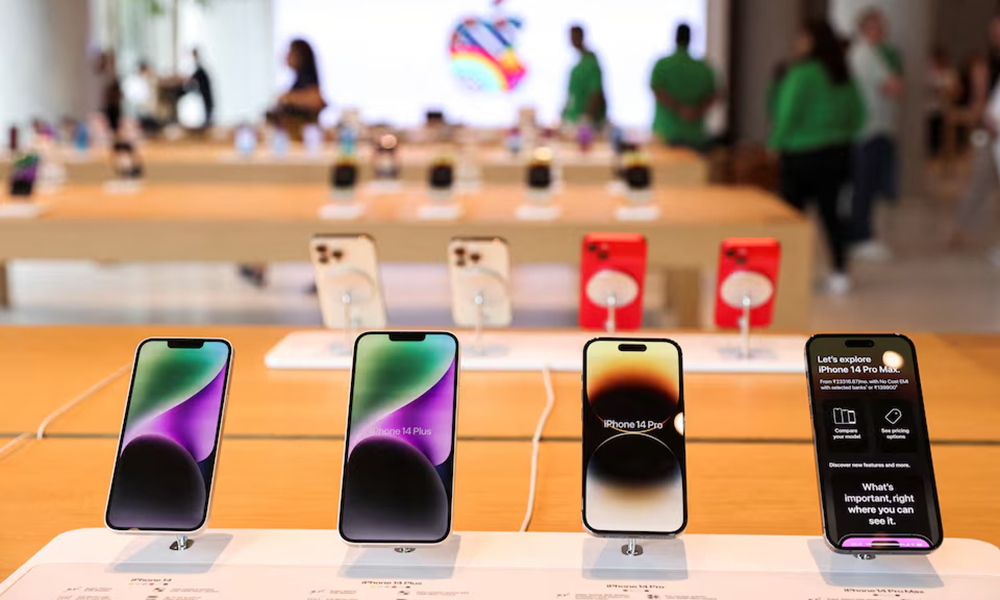Science & Technology
Facebook allows Ukraine war posts urging violence against invading Russians, Putin

Meta Platforms (FB.O) will allow Facebook and Instagram users in some countries to call for violence against Russians and Russian soldiers in the context of the Ukraine invasion, according to internal emails seen by Reuters on Thursday, in a temporary change to its hate speech policy, Reuters reported.
The social media company is also temporarily allowing some posts that call for death to Russian President Vladimir Putin or Belarusian President Alexander Lukashenko, according to internal emails to its content moderators.
“As a result of the Russian invasion of Ukraine we have temporarily made allowances for forms of political expression that would normally violate our rules like violent speech such as ‘death to the Russian invaders.’ We still won’t allow credible calls for violence against Russian civilians,” a Meta spokesperson said in a statement.
The calls for the leaders’ deaths will be allowed unless they contain other targets or have two indicators of credibility, such as the location or method, one email said, in a recent change to the company’s rules on violence and incitement.
Citing the Reuters story, Russia’s embassy in the United States demanded that Washington stop the “extremist activities” of Meta.
“Users of Facebook & Instagram did not give the owners of these platforms the right to determine the criteria of truth and pit nations against each other,” the embassy said on Twitter in a message that was also shared by their India office.
According to Reuters the temporary policy changes on calls for violence to Russian soldiers apply to Armenia, Azerbaijan, Estonia, Georgia, Hungary, Latvia, Lithuania, Poland, Romania, Russia, Slovakia, and Ukraine, according to one email.
In the email recently sent to moderators, Meta highlighted a change in its hate speech policy pertaining both to Russian soldiers and to Russians in the context of the invasion.
“We are issuing a spirit-of-the-policy allowance to allow T1 violent speech that would otherwise be removed under the Hate Speech policy when: (a) targeting Russian soldiers, EXCEPT prisoners of war, or (b) targeting Russians where it’s clear that the context is the Russian invasion of Ukraine (e.g., content mentions the invasion, self-defense, etc.),” it said in the email.
“We are doing this because we have observed that in this specific context, ‘Russian soldiers’ is being used as a proxy for the Russian military. The Hate Speech policy continues to prohibit attacks on Russians,” the email stated.
Last week, Russia said it was banning Facebook in the country in response to what it said were restrictions of access to Russian media on the platform. Moscow has cracked down on tech companies, including Twitter (TWTR.N), which said it is restricted in the country, during its invasion of Ukraine, which it calls a “special operation.”
Many major social media platforms have announced new content restrictions around the conflict, including blocking Russian state media RT and Sputnik in the European Union, and have demonstrated carve-outs in some of their policies during the war, Reuters reported.
Emails also showed that Meta would allow praise of the right-wing Azov battalion, which is normally prohibited, in a change first reported by The Intercept.
The Meta spokesperson previously said the company was “for the time being, making a narrow exception for praise of the Azov Regiment strictly in the context of defending Ukraine, or in their role as part of the Ukraine National Guard.”
Science & Technology
Apple loses top phonemaker spot to Samsung as iPhone shipments drop, IDC says

Apple’s (AAPL.O), opens new tab smartphone shipments dropped about 10% in the first quarter of 2024, hurt by intensifying competition by Android smartphone makers aiming for the top spot, data from research firm IDC showed on Sunday.
Global smartphone shipments increased 7.8% to 289.4 million units during January-March, with Samsung (005930.KS), opens new tab, at 20.8% market share, clinching the top phonemaker spot from Apple, Reuters reported.
The iPhone-maker’s steep sales decline comes after its strong performance in the December quarter when it overtook Samsung as the world’s No.1 phone maker. It’s back to the second spot, with 17.3% market share, as Chinese brands such as Huawei gain market share.
Xiaomi, one of China’s top smartphone makers, occupied the third position with a market share of 14.1% during the first quarter, read the report.
South Korea’s Samsung, which launched its latest flagship smartphone lineup – Galaxy S24 series – in the beginning of the year, shipped more than 60 million phones during the period.
Global sales of Galaxy S24 smartphones jumped 8%, compared to last year’s Galaxy S23 series during their first three weeks of availability, data provider Counterpoint previously said.
In the first quarter, Apple shipped 50.1 million iPhones, down from 55.4 million units it shipped same period last year, according to IDC.
Apple’s smartphone shipments in China shrank 2.1% in the final quarter of 2023 from a year earlier.
The drop underscores the challenges facing the U.S. firm in its third biggest market, as some Chinese companies and government agencies limit employees’ use of Apple devices, a measure that mirrors U.S. government restrictions on Chinese apps on security grounds.
The Cupertino, California-based company in June will hold its Worldwide Developers Conference (WWDC), where it will highlight updates to the software powering iPhones, iPads, and other Apple devices.
Investors are closely watching for updates on artificial intelligence development at Apple, which has so far spoken little about incorporating the AI technology into its devices. The company earlier this year lost the crown as the world’s most valuable company to Microsoft (MSFT.O), opens new tab, Reuters reported.
Science & Technology
China launch of relay satellite Queqiao-2 for lunar probe mission successful

China National Space Administration (CNSA) said on Friday its launch of a key signal relay satellite was a “complete success” and it would serve as the communication bridge for its future lunar probe missions for years to come, state media reported.
China launched the satellite Queqiao-2, which was named after a mythological bridge made of magpies, and two miniature satellites, Tiandu-1 and Tiandu-2, on March 20.
Queqiao-2 will be used as a communications bridge between the ground operations on earth and upcoming lunar probe missions on the far side of the moon until at least 2030.
The moon’s near side always faces earth. That means data transfers from the far side are impossible because there is no direct line of sight.
Queqiao-2 researcher and developer Xiong Liang described the satellite as “the main switch” of the whole fourth phase of lunar missions, according to state television CCTV.
“Only when the main switch is flipped on, all the communications can kick off,” Xiong said.
Queqiao-2 will orbit the moon and relay signals to and from the Chang’e-6 mission, which expected to be launched in May. The robotic Chang’e-6 probe will seek to retrieve samples from an ancient basin, acquiring lunar material from the moon’s hidden side for the first time.
Queqiao-2 will also be used as a relay platform for the Chang’e-7 lunar mission in 2026 and the Chang’e-8 mission in 2028.
The functions and performance of Queqiao-2 met mission requirements and it will be able to provide relay communication services for China’s lunar exploration projects and future lunar missions for China and other countries, said the CNSA, according to CCTV.
Queqiao-2 entered its targeted elliptical orbit on April 2 after a correction midway, near-moon braking and orbital manoeuvre around the moon, CNSA said.
The satellite has successfully communicated with Chang’e 4, which was the first spacecraft to perform a soft landing on the far side of the moon and is still carrying out its exploration mission. It also communicated with the Chang’e-6 probe while it is still on the ground earlier this month.
The successful launch of Queqiao-2 comes after the failed launch of another lunar spacecraft DRO-A/B satellites, which was intended to enter the moon’s distant retrograde orbit (DRO).
China has not released any information on whether or not the satellites can be retrieved.
(Reuters)
Science & Technology
Russia aborts planned test launch of new heavy-lift space rocket

Russian space officials on Tuesday aborted the test launch of a new heavy-lift rocket from its far-eastern launch pad.
The Angara-A5 rocket was scheduled to lift off from the Vostochny space launch facility at 0900 GMT Tuesday, but the launch was aborted two minutes before, AP reported.
Yuri Borisov, head of Roscosmos state space corporation, said the automatic safety system canceled the launch after registering a flaw in the oxidizer tank pressurization system.
He said the next launch attempt was set for Wednesday.
Tuesday’s launch was to be the fourth for the Angara-A5, a heavy-lift version of the new Angara family of rockets that has been developed to replace the Soviet-designed Proton rockets.
-

 Sport4 days ago
Sport4 days agoACL fever grows as fixtures finalized
-

 World5 days ago
World5 days agoUS will not take part in any Israeli retaliatory action against Iran
-

 Latest News5 days ago
Latest News5 days agoOver 50 people dead in traffic accidents over Eid
-

 Latest News4 days ago
Latest News4 days agoUS identifies Kabul airport suicide bomber
-

 Business4 days ago
Business4 days agoAfghanistan-Kazakhstan chamber of commerce opens in Herat
-

 Latest News5 days ago
Latest News5 days agoGood rains enable DABS to increase power production in Kabul
-

 World4 days ago
World4 days agoIsraeli military vows response to Iran attack as calls for restraint mount
-

 Sport3 days ago
Sport3 days agoATN secures exclusive rights to broadcast Paris 2024 Olympics
























